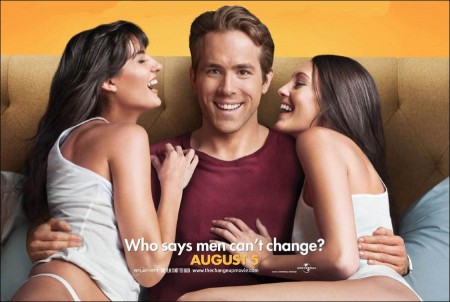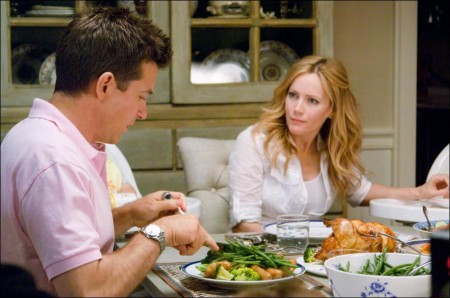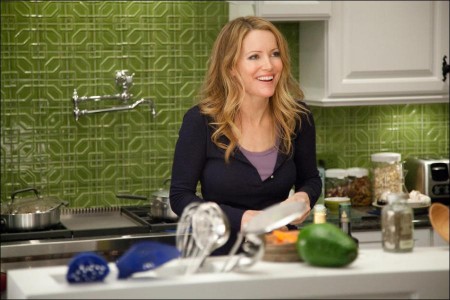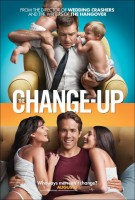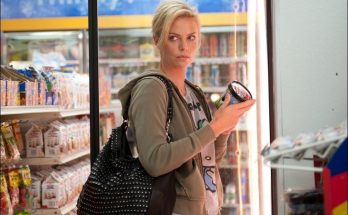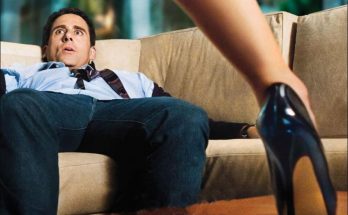Taglines: Who says men can’t change?
Growing up together, Mitch (Ryan Reynolds) and Dave (Jason Bateman) were inseparable best friends, but as the years have passed, they slowly drifted apart. While Dave is an overworked lawyer, husband and father of three, Mitch has remained a single, quasi-employed manchild who has never met a responsibility he liked. To Mitch, Dave has it all: beautiful wife Jamie (Leslie Mann), kids who adore him and a high-paying job at a prestigious law firm. To Dave, living Mitch’s stress-free existence without obligation or consequence would be a dream come true.
Following a drunken night out together, Mitch’s and Dave’s worlds are turned upside down when they wake up in each other’s bodies and proceed to freak the &*#@ out. Despite the freedom from their normal routines and habits, the guys soon discover that each other’s lives are nowhere near as rosy as they once seemed. Further complicating matters are Dave’s sexy legal associate, Sabrina (Olivia Wilde), and Mitch’s estranged father (Alan Arkin). With time not on their side, Mitch and Dave comically struggle to avoid completely destroying each other’s lives before they can find a way to get their old ones back.
Greener Grass: Production Begins
For director/producer David Dobkin, the premise of two best friends who are in desperate need of a big change was one that he found fertile ground for comedy. When he was given the new script from Jon Lucas and Scott Moore, the writing team who created 2009’s record-breaking R-rated blockbuster The Hangover, the Wedding Crashers director was quickly drawn into their engaging story.
Dobkin admits: “I look for ideas and scripts that are very comedic, but also have elements that say something and resonate with people. As a filmmaker, you want to take an idea that feels personal, turn it on its head and actually say something about it. With this story, there’s that wonderful aspect of walking in someone’s shoes and getting to understand why they’ve made the choices they’ve made.”
The filmmaker felt that Lucas and Moore’s take on the body-switching genre pushed the envelope with its raunchy humor, but it didn’t sacrifice the heart that would allow the audience to connect with the characters. He notes: “This script was so intelligently written, and I have to give credit to Lucas and Moore because they nailed it with a very comical, revealing look into the world of men…and what we think about love and sex.”
“There is an incredibly intricate structure to this script, and it was one of the funniest I have ever read,” adds Dobkin. “Lucas and Moore are such masterful writers that they make things seem easy, when in fact there’s been a tremendous amount of thought and depth beneath the surface. It may not be apparent when you first read the script, but once you start pulling it apart, you realize the complexities of it and how much art and effort went into its construction.”
Lucas describes his and Moore’s unlikely inspiration: “Once a month, I have dinners where a bunch of guys get together. At first it was one other guy and me who were the married ones, and all the single guys would laugh at us because our views were so insanely wrong about what it’s like being single. The conversations were like talking to people who were just pulled out of the jungle and didn’t understand how electricity works. I would ask dumb questions like ‘What exactly do you say to women when you meet?,’ and they would ask questions like ‘You’re married…do you have sex once or twice a day?’ Conversations from those nights— and how misunderstood we were to each other—got into the script and became the backbone of the film.”
The writing partners constructed the tale of Dave and Mitch, best friends since childhood, now grown men struggling to maintain a waning friendship. While Dave is a successful type A lawyer who is married with three kids, Mitch is single, barely employed and chasing women like he was still in college. Dave finds maintaining the friendship a chore, while Mitch just wants his old buddy back.
When the two friends meet up for drinks at a local bar and compare their lives, each is a bit smitten by the other’s situation. Mitch looks upon Dave’s stable home life, with a supportive wife and beautiful children, with rose-colored glasses. Mitch can’t understand why every moment in life shouldn’t be pleasurable and irresponsible, but he is envious of how Dave seems to keep all of his family duties in line and be so successful in his career. To add insult to injury, Mitch’s relationship with his father is strained, and the only stability Mitch experiences is when he is around Dave and his family.
The night ends with their getting drunk and peeing in the fountain of the Greek goddess Metis as they argue about how they wish they could be in the other’s shoes. When they wake up, the shape-shifting goddess of wisdom has, as things go in these tales, granted their wish.
The writers approached Dobkin with their screenplay, as they were sure he was the right choice for the material. Says Moore: “We first met David years ago, working on Wedding Crashers, and ever since then Jon and I have wanted to do another project with him. He totally gets story, comedy, and he has really nice hair.”
Lucas adds: “David has an ability to juggle comedy and heart, which this movie requires. Along with being huge fans of his work, we knew he was married and has two little kids…so he could relate to the material. You don’t have to have woken up with a screaming baby at 1:00 a.m., 3:00 a.m. and 5:00 a.m. to direct this movie, but it helps.”
For Dobkin, a body-switching movie was never one he thought he would tackle, but the director was intrigued by the circumstances that could be comically explored when best friends are forced to live each other’s lives. “There are body-switching films that I love, like Face-Off and Freaky Friday, but it is a genre of film that I never wanted to do,” he says. “It is a testament to how superb the writing was that it drew me into the project with its R-rated approach.
“This has been one of the most fulfilling filmmaking experiences of my career,” adds Dobkin. “I think audiences are going to enjoy the raunchy fun and craziness as we deal with the subject matter. They are also going to be surprised because if we did our job right, they will latch onto the heartfelt moments of these guys’ journey that fi nds them learning life lessons about love, friendship and commitment.”
During the fi lm’s development process, producer Neal H. Moritz came onto the project under his company’s banner, Original Film. Known for such juggernaut actioners as all five films in The Fast and the Furious series, Battle: Los Angeles and I Am Legend, Moritz is also no stranger to comedy, with such hits as The Green Hornet, Click and Sweet Home Alabama to his credit.
Moritz admired the simple, accessible premise that the script offered. He says: “David successfully reignited the world of the hard-R, character-based comedy with Wedding Crashers, and Jon and Scott wrote one of the most successful comedies of all time with The Hangover. When you bring together his sensibilities as a director with their instincts in this script, it was impossible to turn it down.”
The Change-Up
Directed by: David Dobkin
Starring: Ryan Reynolds, Jason Bateman, Leslie Mann, Olivia Wilde, Alan Arkin, Mircea Monroe, Sydney Rouviere, Andrea Moore
Screenplay by: Jon Lucas, Scott Moore
Production Design by: Barry Robison
Cinematography by: Eric Alan Edwards
Film Editing by; Lee Haxall, Greg Hayden
Costume Design by: Betsy Heimann
Set Decoration by: Debra Schutt
Art Direction by: Ian Gracie, Thomas Minton
Music by: John Debney
MPAA Rating: R for pervasive strong crude sexual content and language, some graphic nudity and drug use.
Studio: Universal Pictures
Release Date: August 5, 2011
Hits: 100
